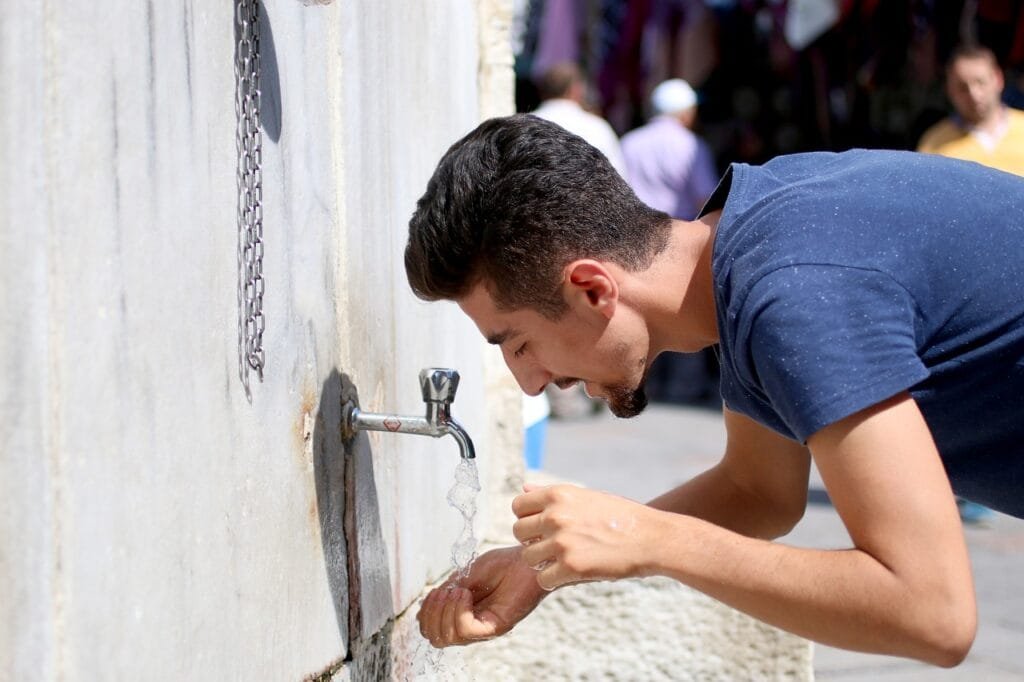In Islam, the act of worship extends far beyond mere physical movements; it encompasses the purification of the heart, mind, and body. Performing wudu (ablution) is an essential ritual purification before certain acts of worship, such as Salah (prayer) and handling the Quran. It is a spiritual cleansing that symbolizes purity and readiness to engage in acts of devotion.
The significance of wudu transcends its physical aspects; it is a spiritual journey that begins with a sincere intention and culminates in a state of heightened awareness and connection with Allah. Through wudu, Muslims cleanse themselves from impurities and prepare their souls to stand before their Creator in prayer.
In the Quran, Allah commands believers to
“O you who have believed, when you rise to [perform] prayer, wash your faces and your forearms to the elbows and wipe over your heads and wash your feet to the ankles. And if you are in a state of janabah, then purify yourselves. But if you are ill or on a journey or one of you comes from the place of relieving himself or you have contacted women and do not find water, then seek clean earth and wipe over your faces and hands with it. Allah does not intend to make difficulty for you, but He intends to purify you and complete His favor upon you that you may be grateful.” (Surah Al-Ma’idah, 5:6).
This verse underscores the importance of wudu as a prerequisite for prayer, highlighting its role in facilitating a state of spiritual purity and readiness.
The teachings of Prophet Muhammad (peace be upon him) further emphasized the importance of performing wudu properly, stating, “The key to Paradise is prayer, and the key to prayer is cleanliness (wudu)” (Sahih Muslim). Through his words and actions, the Prophet illustrated the precise observance of wudu, underscoring its centrality in the life of a believer.
Thus, the proper performance of wudu is a journey of purification and renewal, wherein believers cleanse themselves of physical impurities and worldly distractions, and adorn their souls with the virtues of piety and devotion.
The Definition of Wudu (Ablution)

Wudu, derived from Arabic, means “purification.” It involves washing specific parts of the body in a prescribed manner to spiritually cleanse oneself before approaching acts of worship. The importance of wudu is emphasized in numerous verses of the Quran and the teachings of Prophet Muhammad (peace be upon him).
It was narrated by Abu Huraira (may Allah be pleased with him) that the Messenger of Allah, peace and blessings be upon him, said, “When a Muslim or a believer washes his face in ablution, every sin that he committed with his eyes will be washed away with the last drop of water. When he washes his hands, every sin that he committed with his hands will be washed away with the last drop of water. When he washes his feet, every sin that he committed with his feet will be washed away with the last drop of water, until he emerges purified from sin.” Sahih Muslim 244
Let’s delve into the proper method of making wudu according to the teachings of the Quran and Sunnah.
Steps to Make Wudu
1. Begin with the Intention (Niyyah)
Before starting wudu, one should have a sincere intention in their heart to perform it solely for the sake of Allah, seeking His pleasure and purification. The intention is a crucial aspect of any act of worship in Islam, as it differentiates between routine actions and acts done with devotion.
Umar ibn al-Khattab reported: The Messenger of Allah, peace and blessings be upon him, said, “Verily, deeds are only with intentions, and every person will have only what they intended. (Sahih al-Bukhari 54)
2. Say Bismillah (In the Name of Allah) before starting the Wudu
Start by invoking the name of Allah, the Most Merciful and Compassionate. Saying “Bismillah” before beginning wudu signifies seeking blessings and acknowledging the importance of starting every task with the name of Allah.
Abu Huraira reported: The Messenger of Allah, peace and blessings be upon him, said, “There is no prayer for one without ablution, and there is no ablution for one without mentioning the name of Allah before it.” (Sunan Abi Dawud 101)
3. Wash the Hands Three Times
Begin by washing both hands up to the wrists three times. Wash in-between the fingers in and out and make sure that the water reaches everywhere.
Narrated by Abd Khair:”I saw Ali call for a chair and he sat down, then he called for water in a vessel and washed his hands three times.. then he said: ‘Whoever would like to see how the Messenger of Allah (saw) performed Wudu, this is his Wudu.'” (Sunan An-Nasai 94)
4. Rinse the Mouth and Snuff Water into the Nose At-A-Go
Take water into your mouth and rinse it three times but make sure that you put water into your right hand, use half of the water in your hand to rinse your mouth and sniff the remaining half into your nose and blow it out. Do it like this three times.
Narrated by Abd Khair:”then he rinsed his mouth and nose with one hand, three times.. then he said: ‘Whoever would like to see how the Messenger of Allah (saw) performed Wudu, this is his Wudu.'” (Sunan An-Nasai 94)
5. Wash the Face Thoroughly
With both hands, scoop up water and wash the entire face, from the hairline to the chin and from ear to ear. Ensure that every part of the face, including the beard for men, is thoroughly washed.
Narrated by Abd Khair:”Then he washed his face three times.. then he said: ‘Whoever would like to see how the Messenger of Allah (saw) performed Wudu, this is his Wudu.'” (Sunan An-Nasai 94)
6. Wash the Arms Up to the Elbows
Next, wash the right arm up to the elbow thoroughly, ensuring that water reaches every part. Then, repeat the same process for the left arm.
Narrated by Abd Khair:”and washed his hands three times… then he said: ‘Whoever would like to see how the Messenger of Allah (saw) performed Wudu, this is his Wudu.'” (Sunan An-Nasai 94)
7. Wipe the Head and Ears
Moisten the hands and wipe over the entire head once, from the forehead to the back of the head, and then bring the hands back to the starting position. Additionally, with the moist hand, wipe the inner and outer parts of both ears with the index fingers and thumbs.
Narrated by Amr bin Yahya that his father said to Abdullah bin Zaid bin Asim that: the Prophet (saw) wiped his head with his hands, back and forth, starting at the front of his head and moving his hands to the nape of his neck, then bringing them back to the place he started. (Sunan An-Nasai 98) Narrated by Ibn Abbas that the Messenger of Allah (saw) wiped his ears, putting his forefingers in his ears and wiping the back of them with his thumbs, so he wiped them inside and out. (Sunan Ibn Majah 439)
8. Wash the Feet Up to the Ankles
Finally, wash the right foot, ensuring that water reaches between the toes and covers the entire foot up to the ankle. Then, repeat the same process for the left foot.
Narrated by Abu Hayyah – Ibn Qais – said:”then he washed his feet up to the ankles.” (Sunan An-Nasai 96)
The Supplication (Dua) After Wudu (Ablution)

After completing the purification process of wudu, it is customary for Muslims to supplicate to Allah. The Dua after wudu (ablution) is:
“Ashhadu an la ilaha illallah, wahdahu la sharika lahu, wa ashhadu anna Muhammadan ‘abduhu wa rasuluh.”
Translation: “I bear witness that there is no deity worthy of worship except Allah, alone without any partners, and I bear witness that Muhammad is His servant and Messenger.”
“Allahummaj-a’lni minat-tawwabeena waj’alni minal-mutatahhireen.”
Translation: “O Allah, make me among those who repent and make me among those who purify themselves.”
Conclusion
Performing wudu properly is not only a physical act but also a spiritual journey towards purity and devotion. By following the steps outlined in accordance with the Quran and Sunnah, Muslims can ensure that their wudu is valid and accepted by Allah. May we strive to perform wudu with sincerity, mindfulness, and adherence to the teachings of our beloved Prophet Muhammad (peace be upon him).
Let us embark on our worship with hearts purified and souls uplifted through the blessed practice of wudu.